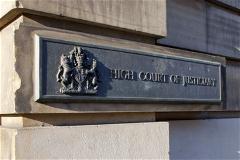
The High Court of Justiciary is Scotland's supreme criminal court. When sitting at first instance as a trial court, it hears the most serious criminal cases, such as murder and rape. A single judge hears cases with a jury of 15 people.
At first instance, it sits in cities and larger towns around Scotland and has a permanent base in Edinburgh (Lawnmarket), Glasgow (Saltmarket) and Aberdeen (Mercatgate). There are periodic sittings in Dumbarton, Lanark, Livingston, Paisley and Stirling. As an appeal court, it sits only in Edinburgh.
Judiciary
The High Court is presided over by the Lord Justice General and the Lord Justice Clerk. They usually sit as chairpersons in the courts of criminal appeal. The other full time judges, who are also Senators of the College of Justice, are known as Lords Commissioners of Justiciary when sitting in the High Court.
Appeal Court
When sitting as an appeal court, the High Court normally consists of two judges when hearing an appeal against sentence and at least three when hearing an appeal against conviction or any other appeal. More judges may sit when the court is dealing with particularly complex cases, or where important matters of law are to be considered. Appeals are heard from the High Court; from more serious (solemn) sheriff court cases and from cases referred by the Scottish Criminal Cases Review Commission.
Additionally, the Lord Advocate may refer to the High Court a point of law which arises in the course of a case for an Opinion. The High Court can give directions which set out the law for future, similar cases.
When there is more than one judge, the most senior acts as the Chair and is normally responsible for announcing the decision and writing any Opinion.
Read more about appeals
Prosecution
Cases in the High Court are prosecuted by advocate deputes, they are advocates or solicitor-advocates who are appointed by the Lord Advocate, in whose name all prosecutions are brought in the public interest. It is possible, although extremely rare, for a private prosecution to be brought.
Defence
The defence will usually be conducted by an advocate or solicitor-advocate. Advocates are members of the Faculty of Advocates and have a status and function corresponding to that of a barrister in England. Advocates once had an exclusive right of audience in the High Court but, since 1990, they share that right with solicitor-advocates. Solicitor-advocates are members of the Law Society of Scotland. They are experienced solicitors who obtain an extension of their rights of audience in the lower courts by undergoing additional training in evidence and in the procedure of the High Court. In addition, a practitioner from another member state of the European Union may appear for a client in the circumstances prescribed by the European Communities (Services of Lawyers) Order 1978. An accused may conduct his own defence in certain types of cases.